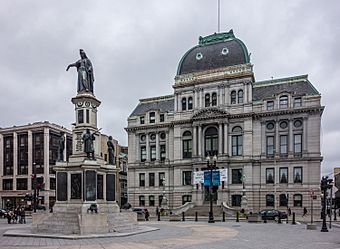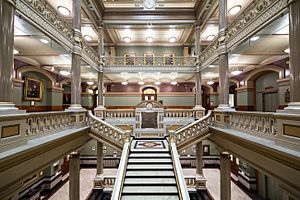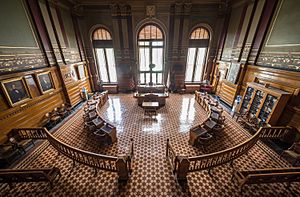Providence City Hall facts for kids
|
Providence City Hall
|
|
|
U.S. Historic district
Contributing property |
|

City Hall in 2016
|
|
| Location | 25 Dorrance Street, Providence, Rhode Island |
|---|---|
| Area | Downtown Providence |
| Built | 1878 |
| Architect | Samuel J. F. Thayer |
| Architectural style | Second Empire Baroque |
| Part of | Downtown Providence Historic District (ID84001967) |
| NRHP reference No. | 75000001 |
Quick facts for kids Significant dates |
|
| Added to NRHP | January 23, 1975 |
| Designated CP | February 10, 1984 |
Providence City Hall is where the local government of Providence, Rhode Island works. It's a big, important building located at the end of Kennedy Plaza. Built in 1878, it's now recognized as a special historic place on the National Register of Historic Places.
Contents
Why Providence Needed a City Hall
Early Government at Market House
When Providence became a city in 1832, most government work happened at the Market House. The City Council and Mayor's Office were on the second floor. As the city grew, they needed more space. Soon, the city government took over the whole building.
Even the entire Market House wasn't enough. In 1845, the City Council decided to build a new, permanent home for the city government. It took about 30 years to find the right spot. This was because council members from the east side of the Providence River and those from the west side disagreed. This long debate was even called "Providence's Thirty Years War" by some historians.
The City Hall Theater Site
The city bought land to build the new City Hall. But construction was delayed. So, the land was rented out, and a wooden theater was built there. This theater was famous for hosting lectures and performances. Even the writer Charles Dickens gave readings there.
In 1869, the theater was renamed "Harrington Opera House." By 1874, it was closed down to make way for the new City Hall.
Building Providence City Hall
Designing "Our Municipal Palace"
The city asked for designs for the new building. Twenty-one ideas were submitted, and four were chosen as finalists. Samuel J. F. Thayer's design, called "Blue Wafer," was picked. He was paid $1,000 for his work.
The building, with some changes from the original plan, cost the city $1,000,000. The first stone was laid on June 24, 1875. The City Hall officially opened on November 14, 1878. The local newspaper, The Providence Journal, proudly called it "Our Municipal Palace."
Famous Visitors and Renovations
Many important people have visited Providence City Hall. President Theodore Roosevelt spoke on its steps on August 23, 1902. John F. Kennedy also spoke there on November 7, 1960, just before he was elected president. In 2000, new outdoor plaques were added to the building.
In 1975, there were worries that the old building might be torn down because it was falling apart. Mayor Vincent A. Cianci, Jr. and others worked hard to save and fix it up. The big renovation project was finished in the 1990s.
Haven Brothers Diner, a famous Rhode Island food truck, parks near City Hall every evening.
City Hall's Architecture
Providence City Hall is built with iron and brick. It has Westerly granite on two sides and New Hampshire granite on the other two. The building stands on a strong base of over 3,000 wooden poles driven deep into the ground.
In the past, four large coal-fired boilers heated the building. They also powered a water-driven elevator that could carry up to 50 people. This elevator had electric bells to call it to different floors.
Before electricity was common, a special clock system kept all the building's clocks on time. A janitor would wind it up every morning. It sent signals to other clocks using batteries. Even though the building got electricity later, this old clock system is still there. You can see it in the fifth-floor archives.
The main floor once had a reception room and the City Messenger's office. This office had many ways to communicate, like 50 speaking tubes and 50 electric bells. The reception room was fancy, with large mirrors and walls made of mahogany wood and stamped leather.
The janitor and their family used to live on the fifth floor. Their home had a kitchen, living room, two bedrooms, and a bathroom. The rest of the fifth floor was used by the City Engineer and for storage. The top of the building has a high, curved roof with round windows.
An iron staircase from the fifth floor leads to the roof area. This is where large batteries were once kept. They powered the city's fire alarm system and the building's clocks and bells. Another staircase led to an even higher storage area in the roof.
Images for kids
-
President Theodore Roosevelt speaking on the steps of City Hall
See also
 In Spanish: Ayuntamiento de Providence para niños
In Spanish: Ayuntamiento de Providence para niños
 | Claudette Colvin |
 | Myrlie Evers-Williams |
 | Alberta Odell Jones |









